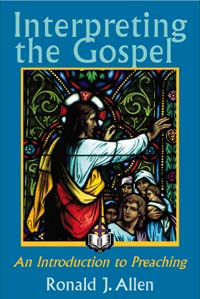
"Ronald J. Allen is the senior professor of preaching at my seminary, Christian Theological Seminary. Allen is also one of the most prolific writers on faculty at this (or any) seminary. I have a shelf full of books by Allen, and the volumes on the shelf seem to keep multiplying. I have reviewed several of Allen's works here, and will be adding further reviews of his work in the future.
"This particular book is a fairly recent text, growing out of Allen's experience of training new preachers and observing preachers in congregational and other settings for many years. The book is divided into the following sections:
"'In this book, I develop a process of learning to preach that builds on a student's energy, while addressing uncertainties that haunt many beginning preachers-- and that plague some of us as long as we preach. ... I do not offer a unique theory of preaching, nor one that contends that all sermons must be developed in a singular way. To the contrary, I build on the recognition that individuals and communities are pluralistic in the ways in which they think and feel and in the ways in which they receive and process communications.'
"From the start, Allen addresses questions that naturally arise (at least one hopes they will arise) in those who dare to preach. Who am I to preach? What if I say something wrong about God? Am I too young or too old? Can I be myself? Can I be original? Will I be heard?
"These questions and more are often present for the new preacher, but in fact they don't go away. I have been preaching weekly for four years at this point, and I find myself asking variations of these questions on a recurring basis. Allen addresses the questions in the first chapter, and follows up on the topics in later chapters.
"Following this exposition of the questions, perhaps the most important question is addressed: Why is Preaching Important? Without knowing the answer to this question, preaching -- and all the anxieties and questions attendant -- are unimportant. Allen gives a number of reasons, all of which are interlocking and appropriate, but the most important I believe are two: God is active in the community through preaching and the Gospel transforms people through preaching. It is no mistake that leaders in the African-American community tend to be preachers; they are people influenced by and understanding of the power of God at work in the community through the gift of preaching, which tends to always be a central element in African-American worship experience.
"The remaining sections of the book are very practical. They help to establish context of preaching: church, the world, and the life of the preacher are all used as primary examples. They work to provide a framework and substance to theological interpretation. Some preachers distrust the word theology, rather in the way many high school students flee from anything that has the words algebra or geometry attached, but in fact, even if they don't know it, they are working theologically in preaching. They will do better with a clear understanding, and Allen provides information in a non-threatening way.
"The fourth and fifth sections get into the mechanics of developing sermons. Allen presents several possible models with their strengths and weaknesses. He talks about the advantages and disadvantages of lectionary preaching, thematic preaching, and topical preaching. Allen then gives a 27-point listing of considerations and tasks at putting together a sermon. I will freely confess that I have not, nor am I likely to ever, go 27 point-by-point steps in constructing my sermons. However, I can see in each of these points elements of things I do in the manner in which I construct my sermons, and seeing things laid out in the manner has helped me to incorporate considerations that might have been underexamined.
"Examining different kinds of sermons as well as images and elements of the sermons come next, as well as practical advice on everything from embodying the sermon -- making sure that eye contact, writing pleasing to the ear, gestures and hand movements, etc. -- to preparing notes and keeping files follows this substantial section. Allen's example sermons from several preachers, including a sermon of his own, a great for illustrating points brought up earlier in the text.
"Allen incorporates his very personal style throughout, which is characterised by a clarity and ease of language, organisation of thought without becoming overly mechanical or forced, and very personal in substance. This final point is illustrated by one of the stories Allen incorporates on the value and importance of preaching. Drawing from his background in the Ozarks, he wrote:
"'My father told me about a couple in the Ozarks who lived in a house at the base of a hollow and who carried a bucket a half mile to the river for water. They worked the soil in the hollow to increase the amount of water that the soil absorbed in order to develop a spring near their cabin. At the time they died, they were still walking to the river. But years later, at the bottom of the hollow, a spring bubbled up. Preaching is often that way.'
"The companion volume, 'Patterns in Preaching' released at the same time as this one, contains sermons from various preachers that can be used as illustrations of the points brought up in this text." - Kurt Messick
(Purchase of this book helps you qualify for the free shipping option if it is being offered at the time of your order.)